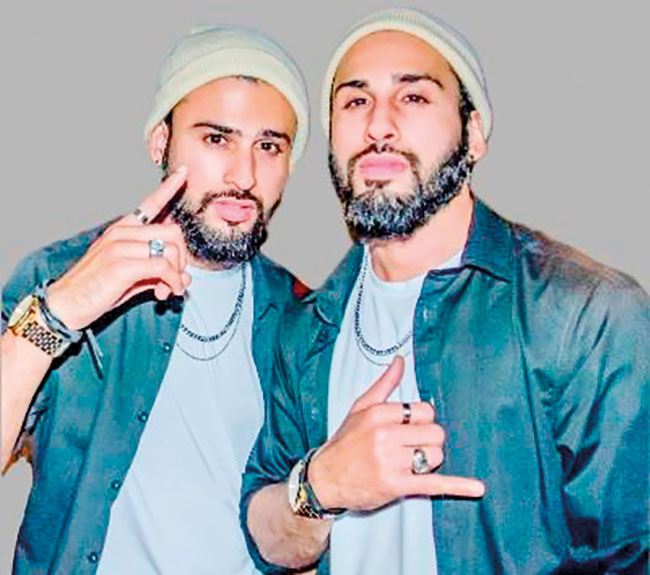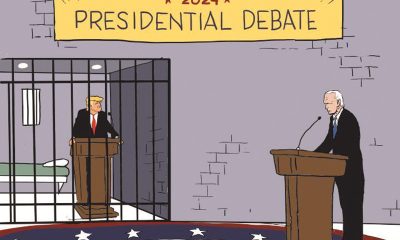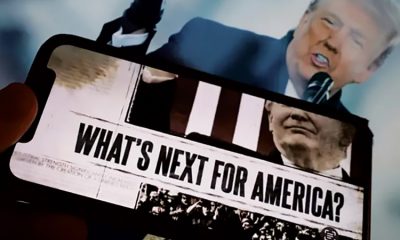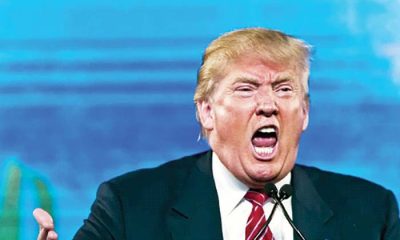Features
DEFIANT HALEY SPINS DOUBLE-DIGIT LOSS AS A WIN, TAUNTS TRUMP “COME ON DONALD, SHOW US WHAT YOU GOT”

TRUMP WINS WEST HAMPSHIRE PRIMARY
by Vijaya Chandrasoma
Florida Governor, Ron DeSantis dropped out of the presidential race before the New Hampshire primary on Tuesday, January 23, after an unexpectedly poor showing in the Iowa caucus and a subsequent drop in national polls. He made the announcement of the suspension of his campaign with a stirring quote he mistakenly attributed to Winston Churchill: “Success is not final, failure is not fatal: it is the courage to continue that counts”. Words Churchill never spoke, but did appear, strangely enough, in a 1938 Budweiser beer commercial.
DeSantis joined other Republican challengers like Senator Tim Scott and Indian descent entrepreneur Vivek Ramaswamy, who also suspended their campaigns and immediately endorsed Trump for the Republican nomination.
This is Trump’s Superpower. He has lost every election since the 2016 presidential election. His Party lost the House and the Senate in the 2018 midterms. He lost the 2020 presidential election to President Biden by a record seven million votes and an Electoral College landslide. The Party again lost the Senate and suffered a setback in the House in the 2022 midterms, which they had expected to win big in a Red Tsunami, but finally held with a wafer-thin majority. Almost every candidate endorsed by Trump for either House has been defeated. In spite of all these losses, Trump remains the undisputed leader of the Republican Party.
The Superpower transforms previous Republican rivals with leadership aspirations, who had excoriated Trump in the past and had in turn been roundly insulted, even humiliated by him – the classic example being Senator Ted Cruz, the 2016 presidential hopeful, whose wife was described by Trump as being “ugly” and his father falsely accused of involvement in the JFK assassination – into the most unctuous of Trump sycophants.
This Superpower also amazingly empowers him to commit the most heinous of crimes – sexual, fraudulent, seditious, even treasonous, with his guilt beyond doubt – and still ensures that no damage is caused to the loyalty of his Party, and even provides an enhancement in his poll numbers and fundraising capabilities.
The Kryptonite, the ultimate weapon against this Superpower, is the Truth. The Republicans’ refusal to acknowledge and accept the truth staring them in the face indicates that Trump has not changed the Party, he has merely revealed its seething underbelly of white supremacism and authoritarianism. A cult immune to Kryptonite.
The most significant and unexpected Republican to withdraw his candidacy last week and endorse Trump was Tim Scott, the “nice guy” moderate Senator from South Carolina. African-American Scott was appointed to the Senate in 2015 by then South Carolina Governor Nikki Haley, Trump’s only remaining challenger for the 2024 Republican nomination.
At an interview at CNN’s The State of the Union with Dana Bash last Sunday, Scott said, “All I want is four more years of Donald Trump”, who “does not see White from Black!” and “will unite the country”. At a time that the country has been polarized as never before, entirely by Trump’s racist, anti-immigrant policies and rants about vermin poisoning the pure white blood of America.
Asked why he endorsed Trump for the nomination, instead of his erstwhile South Carolina sponsor, Nikki Haley, Scott said he was thinking of the country as a whole and not just his home state. He danced around several issues, shamelessly twisting his earlier criticisms of Trump playing the permanent victim and whining about grievances and witch hunts. He said what he really meant was that Trump had indeed been “aggrieved” by the Biden administration, which had “weaponized the Department of Justice” to unfairly prosecute him. A blatant lie, the Trump Superpower in action.
Scott refused to answer Dana Bash’s question whether he agreed with Trump’s description of those domestic terrorists convicted and imprisoned for their part in the January 6 insurrection as “hostages”. He said he would rather let “Lady Justice get back her blindfolds”. A performance of brown-nosing (metaphorically, for a black man), reminiscent of the glory lickspittle days of Ted Cruz and Lindsay Graham.
The campaign slogan of the last woman, Nikki Haley, standing between Trump and the Republican nomination was: “I am the last best hope of avoiding a rematch between two old men, a contest 75% of Americans don’t want”. She has, on the advice of her powerful sponsor, West Hampshire Governor Chris Sununu, finally stepped up from her previously tepid rebukes of Trump to a tougher approach, calling him a bully and a liar, and going after him for his disastrous first term, his electoral losses since his election to the presidency in 2016 and his criminal behavior after his electoral defeat in 2020.
At recent campaign speeches, Trump has continued to make even more outrageously false statements than usual. He said that he beat President Obama in a landslide in 2016, when his presidential rival was Hillary Clinton. He complained that it was Nikki Haley (repeating her name numerous times), who was in charge of security during January 6, 2021 and had failed to summon federal troops to quell the insurrection, confusing Nikki Haley with Speaker Nancy Pelosi. A trifecta of hallucinations. Only Trump had the power to summon federal troops, which he chose to ignore as he was rooting for the insurrectionists in their violent attempt to prevent the constitutional transfer of presidential power. An insurrection he had planned and incited. And Nikki Haley was a private citizen who was not even in Washington D.C. on that day of infamy.
There are numerous recent gaffes and losses of memory which indicate that Trump’s mind has turned into a cesspit of hallucinatory delusion. The fact that he still brags about acing a test designed to identify incipient dementia, as he did during his presidency, is proof that he is on the cusp of that disease, which is becoming more transparent at every passing rant.
New Hampshire is a more liberal, New England state, which, unlike Iowa, where only registered Republicans have the right to vote, allows Independents to vote in its Republican primary.
Trump went on to register a win over Haley by double digits, finally garnering 54.5% of the votes to Haley’s 43.2%. Trump won by 11% points, when the polls had projected that he would win by over 30%. The New Hampshire primary showed that the polls, which projected a huge win for Trump, were highly exaggerated, and sowed doubt about the authenticity of even the national polls.
Trump was at his usual ego maniacal worst during his victory speech, flanked by his brand-new sycophants, Tim Scott and Vivek Ramaswamy, who made worshipful speeches about “the greatest American leader in history”. He showed his ire at Haley for refusing to suspend her campaign, and even showed his complete lack of class, even insulting the beautiful dress she wore.
Haley made a gracious but defiant concession speech, congratulating Trump on his victory. However, she did say that she had no intention of dropping out of the race. The best lines in her speech were that “Trump was the right president at the right time….not any more”, “Chaos follows Donald Trump” and “New Hampshire is the first in the nation. It is not the last in the nation. This race is far from over”.
Nikki Haley acted as if she had won the primary, which drove Trump crazy. He was expecting Haley, like DeSantis and the other sycophants, to fold her tent, bow out of the race, kiss the ring and beg for the Vice-President position.
Haley proved she has more balls than all the Republicans who had vied for the Republican nomination, only to tamely and prematurely throw in the towel. She will be in Trump’s face at least till the primary in her home state of South Carolina, in a month. She is gaining more support from Independents and moderate Republicans, who are getting sick and tired of his mean-spirited, mendacious, and whining “permanent victim” posture.
At her announcement that she was staying in the race, Haley said, “What a great night. God is so good. Donald Trump just threw a temper tantrum. He pitched a fit. He was insulting, but I know that’s what he does when he is insecure”. She ended her speech, taunting Trump: “Come on, Donald. Show us what you got!”
Perhaps she has little chance of winning the nomination, but she certainly has got under Trump’s skin, by refusing to quit the campaign and preventing him from claiming the Republican nomination outright after New Hampshire.
Trump was also too obtuse to understand the irony when he branded Haley “an impostor” because she did not concede that she had lost the fight (in his opinion) for the Republican nomination. Strange comment from a man who hasn’t yet conceded an election he lost over three years ago. He has stated that “anybody who contributes to the Haley campaign will be permanently banned from the MAGA camp” (cult?).
Trump may have won the Republican New Hampshire primary, but the real winners last Tuesday were the Democrats, who saw Independent voters, exasperated with the chaos that accompanies Trump, turning up in droves to vote against him. And Independents hold the key to electoral victory in November.
There is a chance that the course of Republican leadership, indeed the whole national election storyline, might undergo an upheaval if one or both of these two protagonist octogenarians suffer mental or physical breakdowns, or worse, before November. Not as unlikely an event as you might think. Believe me, ten months represent a long time in the life of old folks who have long passed the BEST BY date. Especially as both the current principal presidential candidates are already showing distinct signs of decrepitude, with a series of stumbles, falls, gaffes and losses of memory. Aneurysms, dementia, even death can’t be too far away on the horizon.
Also, in an already confused election scenario, the likely entry of Third-Party candidate/s into the presidential race will further complicate calculations to an extent where anything would be possible. Add to this Pandora’s Box the global problems caused by the Israel/Palestine and Russia/Ukraine wars, and we are surely looking at a most unpredictable, even cataclysmic, 2024.
The 2024 Oscar nominations were announced last Tuesday. As expected, Trump secured a nomination in the Best Actor category for his sterling performance as James Bond in the remake of Ian Flemings’s classic, From Russia With Love.
Asked for comment, Trump said, “I am not surprised. That role was made for me. I already have a License to Kill, we call it Presidential Immunity. Besides, I make a much better-looking Bond than the late Sean Connery. My friend, Vladimir Putin, was an excellent Director of the movie. We will do many more great things together in the future”.
Features
Recruiting academics to state universities – beset by archaic selection processes?

Time has, by and large, stood still in the business of academic staff recruitment to state universities. Qualifications have proliferated and evolved to be more interdisciplinary, but our selection processes and evaluation criteria are unchanged since at least the late 1990s. But before I delve into the problems, I will describe the existing processes and schemes of recruitment. The discussion is limited to UGC-governed state universities (and does not include recruitment to medical and engineering sectors) though the problems may be relevant to other higher education institutions (HEIs).
How recruitment happens currently in SL state universities
Academic ranks in Sri Lankan state universities can be divided into three tiers (subdivisions are not discussed).
* Lecturer (Probationary)
– recruited with a four-year undergraduate degree. A tiny step higher is the Lecturer (Unconfirmed), recruited with a postgraduate degree but no teaching experience.
* A Senior Lecturer can be recruited with certain postgraduate qualifications and some number of years of teaching and research.
* Above this is the professor (of four types), which can be left out of this discussion since only one of those (Chair Professor) is by application.
State universities cannot hire permanent academic staff as and when they wish. Prior to advertising a vacancy, approval to recruit is obtained through a mind-numbing and time-consuming process (months!) ending at the Department of Management Services. The call for applications must list all ranks up to Senior Lecturer. All eligible candidates for Probationary to Senior Lecturer are interviewed, e.g., if a Department wants someone with a doctoral degree, they must still advertise for and interview candidates for all ranks, not only candidates with a doctoral degree. In the evaluation criteria, the first degree is more important than the doctoral degree (more on this strange phenomenon later). All of this is only possible when universities are not under a ‘hiring freeze’, which governments declare regularly and generally lasts several years.
Problem type 1
– Archaic processes and evaluation criteria
Twenty-five years ago, as a probationary lecturer with a first degree, I was a typical hire. We would be recruited, work some years and obtain postgraduate degrees (ideally using the privilege of paid study leave to attend a reputed university in the first world). State universities are primarily undergraduate teaching spaces, and when doctoral degrees were scarce, hiring probationary lecturers may have been a practical solution. The path to a higher degree was through the academic job. Now, due to availability of candidates with postgraduate qualifications and the problems of retaining academics who find foreign postgraduate opportunities, preference for candidates applying with a postgraduate qualification is growing. The evaluation scheme, however, prioritises the first degree over the candidate’s postgraduate education. Were I to apply to a Faculty of Education, despite a PhD on language teaching and research in education, I may not even be interviewed since my undergraduate degree is not in education. The ‘first degree first’ phenomenon shows that universities essentially ignore the intellectual development of a person beyond their early twenties. It also ignores the breadth of disciplines and their overlap with other fields.
This can be helped (not solved) by a simple fix, which can also reduce brain drain: give precedence to the doctoral degree in the required field, regardless of the candidate’s first degree, effected by a UGC circular. The suggestion is not fool-proof. It is a first step, and offered with the understanding that any selection process, however well the evaluation criteria are articulated, will be beset by multiple issues, including that of bias. Like other Sri Lankan institutions, universities, too, have tribal tendencies, surfacing in the form of a preference for one’s own alumni. Nevertheless, there are other problems that are, arguably, more pressing as I discuss next. In relation to the evaluation criteria, a problem is the narrow interpretation of any regulation, e.g., deciding the degree’s suitability based on the title rather than considering courses in the transcript. Despite rhetoric promoting internationalising and inter-disciplinarity, decision-making administrative and academic bodies have very literal expectations of candidates’ qualifications, e.g., a candidate with knowledge of digital literacy should show this through the title of the degree!
Problem type 2 – The mess of badly regulated higher education
A direct consequence of the contemporary expansion of higher education is a large number of applicants with myriad qualifications. The diversity of degree programmes cited makes the responsibility of selecting a suitable candidate for the job a challenging but very important one. After all, the job is for life – it is very difficult to fire a permanent employer in the state sector.
Widely varying undergraduate degree programmes.
At present, Sri Lankan undergraduates bring qualifications (at times more than one) from multiple types of higher education institutions: a degree from a UGC-affiliated state university, a state university external to the UGC, a state institution that is not a university, a foreign university, or a private HEI aka ‘private university’. It could be a degree received by attending on-site, in Sri Lanka or abroad. It could be from a private HEI’s affiliated foreign university or an external degree from a state university or an online only degree from a private HEI that is ‘UGC-approved’ or ‘Ministry of Education approved’, i.e., never studied in a university setting. Needless to say, the diversity (and their differences in quality) are dizzying. Unfortunately, under the evaluation scheme all degrees ‘recognised’ by the UGC are assigned the same marks. The same goes for the candidates’ merits or distinctions, first classes, etc., regardless of how difficult or easy the degree programme may be and even when capabilities, exposure, input, etc are obviously different.
Similar issues are faced when we consider postgraduate qualifications, though to a lesser degree. In my discipline(s), at least, a postgraduate degree obtained on-site from a first-world university is preferable to one from a local university (which usually have weekend or evening classes similar to part-time study) or online from a foreign university. Elitist this may be, but even the best local postgraduate degrees cannot provide the experience and intellectual growth gained by being in a university that gives you access to six million books and teaching and supervision by internationally-recognised scholars. Unfortunately, in the evaluation schemes for recruitment, the worst postgraduate qualification you know of will receive the same marks as one from NUS, Harvard or Leiden.
The problem is clear but what about a solution?
Recruitment to state universities needs to change to meet contemporary needs. We need evaluation criteria that allows us to get rid of the dross as well as a more sophisticated institutional understanding of using them. Recruitment is key if we want our institutions (and our country) to progress. I reiterate here the recommendations proposed in ‘Considerations for Higher Education Reform’ circulated previously by Kuppi Collective:
* Change bond regulations to be more just, in order to retain better qualified academics.
* Update the schemes of recruitment to reflect present-day realities of inter-disciplinary and multi-disciplinary training in order to recruit suitably qualified candidates.
* Ensure recruitment processes are made transparent by university administrations.
Kaushalya Perera is a senior lecturer at the University of Colombo.
(Kuppi is a politics and pedagogy happening on the margins of the lecture hall that parodies, subverts, and simultaneously reaffirms social hierarchies.)
Features
Talento … oozing with talent

 This week, too, the spotlight is on an outfit that has gained popularity, mainly through social media.
This week, too, the spotlight is on an outfit that has gained popularity, mainly through social media.
Last week we had MISTER Band in our scene, and on 10th February, Yellow Beatz – both social media favourites.
Talento is a seven-piece band that plays all types of music, from the ‘60s to the modern tracks of today.
The band has reached many heights, since its inception in 2012, and has gained recognition as a leading wedding and dance band in the scene here.
The members that makeup the outfit have a solid musical background, which comes through years of hard work and dedication
Their portfolio of music contains a mix of both western and eastern songs and are carefully selected, they say, to match the requirements of the intended audience, occasion, or event.
Although the baila is a specialty, which is inherent to this group, that originates from Moratuwa, their repertoire is made up of a vast collection of love, classic, oldies and modern-day hits.
The musicians, who make up Talento, are:
Prabuddha Geetharuchi:
(Vocalist/ Frontman). He is an avid music enthusiast and was mentored by a lot of famous musicians, and trainers, since he was a child. Growing up with them influenced him to take on western songs, as well as other music styles. A Peterite, he is the main man behind the band Talento and is a versatile singer/entertainer who never fails to get the crowd going.
Geilee Fonseka (Vocals):
A dynamic and charismatic vocalist whose vibrant stage presence, and powerful voice, bring a fresh spark to every performance. Young, energetic, and musically refined, she is an artiste who effortlessly blends passion with precision – captivating audiences from the very first note. Blessed with an immense vocal range, Geilee is a truly versatile singer, confidently delivering Western and Eastern music across multiple languages and genres.
Chandana Perera (Drummer):
His expertise and exceptional skills have earned him recognition as one of the finest acoustic drummers in Sri Lanka. With over 40 tours under his belt, Chandana has demonstrated his dedication and passion for music, embodying the essential role of a drummer as the heartbeat of any band.
Harsha Soysa:
(Bassist/Vocalist). He a chorister of the western choir of St. Sebastian’s College, Moratuwa, who began his musical education under famous voice trainers, as well as bass guitar trainers in Sri Lanka. He has also performed at events overseas. He acts as the second singer of the band
Udara Jayakody:
(Keyboardist). He is also a qualified pianist, adding technical flavour to Talento’s music. His singing and harmonising skills are an extra asset to the band. From his childhood he has been a part of a number of orchestras as a pianist. He has also previously performed with several famous western bands.
Aruna Madushanka:
(Saxophonist). His proficiciency in playing various instruments, including the saxophone, soprano saxophone, and western flute, showcases his versatility as a musician, and his musical repertoire is further enhanced by his remarkable singing ability.
Prashan Pramuditha:
(Lead guitar). He has the ability to play different styles, both oriental and western music, and he also creates unique tones and patterns with the guitar..
Features
Special milestone for JJ Twins

The JJ Twins, the Sri Lankan musical duo, performing in the Maldives, and known for blending R&B, Hip Hop, and Sri Lankan rhythms, thereby creating a unique sound, have come out with a brand-new single ‘Me Mawathe.’
In fact, it’s a very special milestone for the twin brothers, Julian and Jason Prins, as ‘Me Mawathe’ is their first ever Sinhala song!
‘Me Mawathe’ showcases a fresh new sound, while staying true to the signature harmony and emotion that their fans love.
This heartfelt track captures the beauty of love, journey, and connection, brought to life through powerful vocals and captivating melodies.
It marks an exciting new chapter for the JJ Twins as they expand their musical journey and connect with audiences in a whole new way.
Their recent album, ‘CONCLUDED,’ explores themes of love, heartbreak, and healing, and include hits like ‘Can’t Get You Off My Mind’ and ‘You Left Me Here to Die’ which showcase their emotional intensity.
Readers could stay connected and follow JJ Twins on social media for exclusive updates, behind-the-scenes moments, and upcoming releases:
Instagram: http://instagram.com/jjtwinsofficial
TikTok: http://tiktok.com/@jjtwinsmusic
Facebook: http://facebook.com/jjtwinssingers
YouTube: http://youtube.com/jjtwins
-

 Opinion5 days ago
Opinion5 days agoJamming and re-setting the world: What is the role of Donald Trump?
-

 Features5 days ago
Features5 days agoAn innocent bystander or a passive onlooker?
-

 Features6 days ago
Features6 days agoRatmalana Airport: The Truth, The Whole Truth, And Nothing But The Truth
-

 Business7 days ago
Business7 days agoDialog partners with Xiaomi to introduce Redmi Note 15 5G Series in Sri Lanka
-

 Features7 days ago
Features7 days agoBuilding on Sand: The Indian market trap
-

 Opinion7 days ago
Opinion7 days agoFuture must be won
-

 Features2 days ago
Features2 days agoBrilliant Navy officer no more
-

 Opinion2 days ago
Opinion2 days agoSri Lanka – world’s worst facilities for cricket fans



























